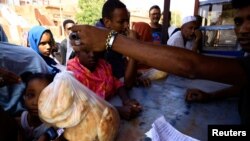The relative calm provided a chance for some Sudanese to venture out.
Khartoum resident Ali Mohammed said the water supply still had not been restored on Wednesday, "but at least I was able to go out and buy water for my family."
Mohammed Taher, 55, was finally able to "go to Khartoum's central market five kilometers away to buy food and return without incident," he said.
The relative calm gave Ihssan Dafaallah the chance to take his mother to a doctor, "because she had gone without medicine for 20 days,"
In southern Khartoum, men sat on plastic chairs in front of a burned out bank building.
As the cease-fire tenuously holds, Washington and Riyadh stressed preparations were underway "to deliver lifesaving assistance" to the people of Sudan.
Aid agencies had already been ramping up deliveries despite the killing of some of their workers, looting of their facilities, and most hospitals being unable to function in conflict areas.
Humanitarians have sought safe corridors so assistance can reach the 25 million Sudanese - half the population - who the U.N. says need aid.
The war broke out on April 15, sparking frantic mass evacuations of thousands of foreigners and forcing more than 1.3 million people to flee their homes internally and across borders.
The chaos has left millions hunkering down in their homes to hide from the bullets and roaming looters amid power blackouts and shortages of water, food, medicines and other staples.
"In spite of successive ceasefires, civilians continue to be exposed to serious risk of death and injury," United Nations rights chief Volker Turk said.
Numerous ceasefires were previously announced and immediately violated, but the U.S. and Saudi Arabia said this one is different because it is a signed deal supervised by a monitoring committee.
Meanwhile, a mass exodus has continued into neighboring countries, including Chad, Egypt and South Sudan, sparking regional fears the conflict will spread across borders because of transnational ethnic ties.
Fighting has been especially deadly in the Darfur region, where more than 700 fatalities have been reported in the West Darfur state capital El Geneina since the war began, ACLED said.
Sudan expert Alex de Waal warned the "trajectory of state collapse" is now threatening "to turn Sudan as a whole, including Khartoum, into something that resembles the Darfur of 10 to 15 years ago."
He pointed to RSF leader Mohamad Dagalo's roots in the Janjaweed and said this "is the environment within which "Hemeti" [Dagalo] thrived, where money and guns determine everything - this is the future of Sudan if this carries on."
Like many Sudanese citizens, Yasser Abdelaziz, a civil servant in the northern town of Shendi, said he fears a war worse than other Middle East conflicts and more like the turmoil seen elsewhere in the Horn of Africa.
"I'm afraid that the scenario to come will not be Syria, Libya or Yemen," he said, "but the Somali scenario, with people driven by racism and tribalism."

Forum